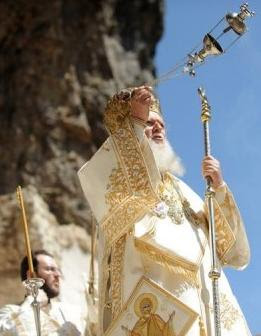Istanbul, August 16, 2012
by NAT da Polis
On
the occasion of the Feast of the Dormition of the
Virgin (in the West: the Assumption of Mary into
Heaven), the Ecumenical Patriarch of Constantinople
issued a statement in which he expresses "deep
concern" for the situation in Syria and the
Christian community there. The patriarch also
highlighted other areas of tension throughout the
Middle East, Nigeria and Sudan, and demanded the end
of the political exploitation of religious
fundamentalism.

Yesterday, for the third consecutive year, Bartholomew went to celebrate the feast of Mary in the monastery of Our Lady of Sumela, on the Black Sea, where since 2009 the Turkish government has given permission for Mass to be celebrated on August 15, after an 80 years ban and after the transformation of the monastery into a museum.
The patriarch focused his address on the crisis which is affecting humanity and the resulting spread of violence in the world.
"The Ecumenical Patriarchate - the statement reads - is deeply concerned about the spread of violence throughout the world today. We are faced with intolerance that not only undermines global peace, but constitutes a denial of human dignity. Phenomena such as murders, acts of racism, genocide, ethnic cleansing, anti-Semitism, destruction of places of worship, are expressions of barbarity, and must be categorically and unequivocally condemned, especially when [these acts] are committed in the name of religion. "
"The Ecumenical Patriarchate - the statement continues - particularly expresses concern at the situation especially in the Middle East, Nigeria and Sudan. Clashes and conflicts between Christians and Muslims in these places should and can be resolved only by the strengthening of love of neighbor, as an expression of relationship of peaceful coexistence. "
"The Ecumenical Patriarchate - it adds - is also very concerned about the future of the Syrian people and the future of Christianity in that land, and appeals to all the protagonists of the conflict, to silence their weapons immediately, for urgent humanitarian reasons".
"The solution to all these conflicts - it concludes - is found mainly through dialogue. Because dialogue is the only and best means of understanding and reconciliation of our differences, and is an agent of change and reconciliation. Therefore, religious leaders from around the world have the duty and moral obligation to oppose the conflicts and promote peace as the only necessity. Religion should never be exploited or used as a pretext for the various conflicts, manipulating fundamentalism for political use. Any crime committed in the name of religion, is a crime against religion. "
